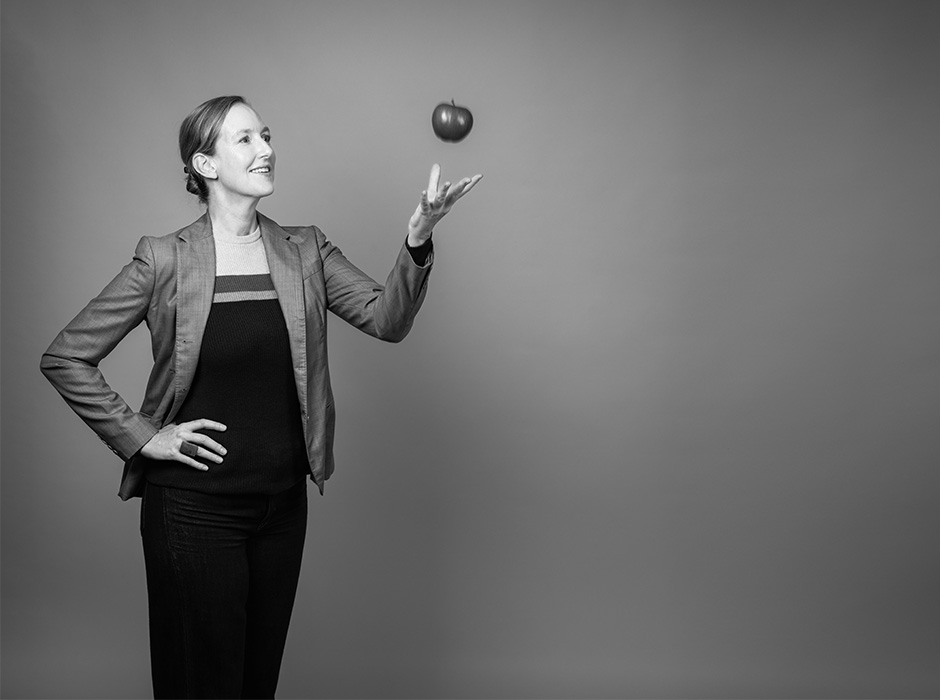
Professor Tamlin Conner: “Clinical psychology is about ameliorating the negative. But I wanted to explore promoting the positive. Just because you are free from depression, doesn’t mean you are happy.”
Some people spend their lives searching for happiness. Newly promoted psychology professor Tamlin Conner has turned it into a career.
Conner’s work examines “modifiable lifestyle habits that improve or impede wellbeing” or, in other words, the small, manageable things humans can do to make them happy and healthy.
Her research spans the science of wellbeing and includes large-scale multidisciplinary studies of the psychological, nutritional and biological predictors of wellbeing, and interventions to improve wellbeing through psychological and lifestyle changes.
While much of psychology is concerned with the “abnormal”, Conner is interested in “normal” behaviour. Rather than focusing on negative emotions – depression, anxiety, etc – she wanted to focus on positive emotions – happiness and wellbeing.
“Clinical psychology is about ameliorating the negative. But I wanted to explore promoting the positive. Just because you are free from depression, doesn’t mean you are happy.”
In some ways her findings are common sense – eating more fruit and vegetables, exercising, getting plenty of sleep, going out into nature, engaging in something creative – all increase wellbeing. What is surprising is how much of a measurable difference they make.
In one study, in which Conner collaborated with Otago Human Nutrition researchers, participants self-reported how many serves of fruit and vegetables they ate each day. Those eating more serves reported feeling happier, calmer and more energetic than those who were eating fewer serves and, vitally, eating more fruit and vegetables predicted improvements in happiness the next day and not the other way around.
Another study went further – showing a causal link between fruit intake and happiness. Collaborating with Professor Margreet Vissers of the University’s Christchurch-based Centre for Free Radical Research, the team recruited participants low in vitamin C and asked them to take a placebo tablet, a vitamin C tablet, or eat two kiwifruit daily for four weeks. While both the vitamin C and kiwifruit groups showed an increase in vitamin C levels, only those eating the actual fruit reported an increase in their “zest for life”.
Conner’s interest in people was evident even when she was a child growing up in Southern California.
“I have been interested, my whole life, in how other people live their lives – what they do, what makes them tick, and what motivates and engages them. Even growing up, I was a keen observer of people. I loved people watching. I didn’t know I would turn that into a career.”
Her first choice, in turning a fascination with people into a career, was journalism. But she quickly discovered she didn’t like the pressured, short-term timescales of journalism and switched her major to another subject focused on people: psychology.
“It was a better fit.”
Conner completed her undergraduate degree at the University of Colorado at Boulder and went on to complete her PhD at Boston College with Professor Lisa Feldman Barrett.
Under the supervision of Professor Barrett and using what was modern technology at the time –personal digital assistants – she compared how people remembered their emotions versus how they actually experienced their emotions as reported on the digital assistants in their daily lives.
Her timing was right on two fronts. Firstly, the burgeoning new field of wellbeing. Globally people were becoming more and more interested in happiness and wellbeing; indeed good health and wellbeing is now ranked third in the United Nations Sustainable Development Goals. Secondly, the growth in technology that allows researchers to measure people’s feelings, experiences and behaviours in the moment of their everyday lives.
While personal digital assistants were the height of modern technology when Conner conducted her early studies, now, of course, she and her fellow researchers use apps and messages sent directly to people’s smartphones. She has made this field her own, co-editing the Handbook of Research Methods for Studying Daily Life.
Conner arrived at Otago in 2008 and opened her own lab – the Daily Experiences Lab. Since then, she has collaborated with many others and has become a global expert in the behaviours that impact wellbeing.
Alongside her work on fruit and vegetables, she has examined the role of sleep, exercise and creativity. During the COVID-19 lockdowns, her work on creativity (which showed that engaging in a creative task predicted increased feelings of happiness for the next few days) was cited as evidence that baking would help people feel better. She has also worked in special populations – such as those living with chronic pain or food allergies.
Conner is an exceptional researcher and teacher. She won the Division of Sciences Outstanding Teacher award in 2022 and the Otago University Students' Association Supervisor of the Year award in 2017. Her work is supported by high profile grants.
Her promotion to professor is the achievement of a lifelong goal. It is also an added responsibility – and she aims to give back to the field over the next few decades.
And is she happy?
“Sometimes. I probably work too much to have a balanced life. But that will come with time.”
Does she do all of the things she has researched which help with happiness?
“Not all the things, but I do I eat well and I exercise.”
Watch her IPL: Pathways to wellbeing